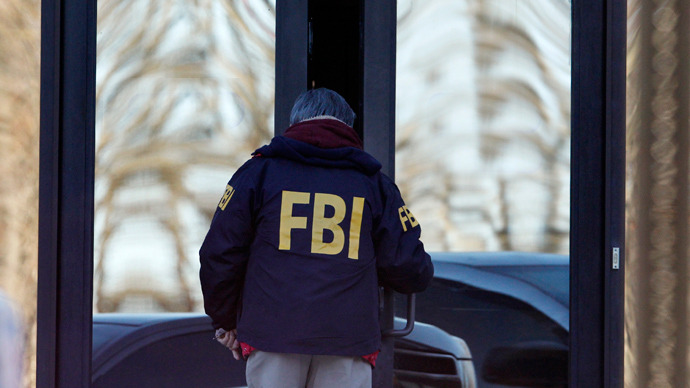Published on Jan 13, 2014
January 12, 2014 MSNBC News.....
Published on Jan 13, 2014
January 12, 2014 MSNBC News.....
FISA court, which approves FBI, NSA surveillance, faces reform challenge from Oregon senators
America's most controversial courtroom has no need for a gavel and no place for a gallery. In fact, situated on the third floor of the federal courthouse in Washington, D.C., it isn't so much a courtroom as an office with thick walls designed to defeat electronic surveillance.Inside, judges on the Foreign Intelligence Surveillance Court pore through -- and almost always approve -- government applications to eavesdrop on people suspected of acting as agents of foreign governments. Typically this means allowing the government to snoop on suspected terrorists or spies on U.S. soil and those who might phone, text, email or communicate with them from abroad.
Critics have long accused the court of being a rubber stamp that violates the constitutional rights of surveillance targets. The panel provoked national outrage in June, when The Guardian newspaper of London published a document -- leaked by former National Security Agency contractor Edward Snowden -- showing the court ordered Verizon to turn over millions of Americans' phone records to the NSA.
Though the court sits three time zones away, it's intimately linked to the residents of Oregon, whose U.S. senators have sponsored or signed onto at least eight pieces of legislation to revamp the panel since the NSA revelations. Those senators -- Democrats Ron Wyden and Jeff Merkley -- want to change the law that created the court: the Foreign Intelligence Surveillance Act of 1978, better known as FISA.
They say amendments to the law since 9/11 -- along with rapid advances in surveillance technology -- have created a court with the power to secretly trample the privacy of ordinary citizens. They want a court with more transparency in its rulings and an advocate inside the panel to represent the privacy and civil rights of those targeted by government eavesdropping.
Oregon possesses a multitude of powerful ties to the court, its decisions and its future.
- Wyden is a senior member of the Senate Select Committee on Intelligence, giving him a rare portal into the doings of the court.
- Since the terrorist attacks of Sept. 11, 2001, the panel has authorized surveillance in Oregon of at least 16 people and a nonprofit business suspected of illegal ties to foreign powers, according to court papers.
- Michael W. Mosman, one of Oregon's most respected federal judges, was appointed in May as the newest member of the 11-judge surveillance court. The 56-year-old judge and his colleagues work alone in one-week stretches to review piles of FBI and NSA surveillance applications, presiding over some of the nation's most closely held secrets. Mosman declined to be interviewed for this story.
- Edward Leavy, a senior federal appeals court judge in Portland, previously sat on a little-known panel that reviews the surveillance court's rare denials.
- Two top-rail attorneys with ties to Oregon -- Todd M. Hinnen, former acting assistant U.S. attorney general for national security, and Jonathan Turley, a George Washington University Law School professor -- have become friendly combatants in a national debate over the court's future.
He's fond of quoting Benjamin Franklin on the subject: "They who can give up essential liberty to obtain a little temporary safety, deserve neither liberty nor safety."
Yet it was liberty that motivated Congress to enact the law in the first place.
--------
During the Cold War years of the 1970s, President Richard M. Nixon secretly approved orders for domestic electronic surveillance of America's enemies.Bipartisan lawmakers drafted FISA to take decisions about such snooping out of the Oval Office and put them into the hands of the three branches of government. The American Civil Liberties Union blessed the legislation, while some constitutional scholars and civil libertarians argued that Congress was creating a star chamber.
The law enacted 35 years ago permits the executive branch -- by way of the Justice Department -- to snoop on suspects electronically or physically. The judicial branch staffs the court with U.S. district judges. The legislative branch, through congressional committees, oversees its decisions.
Congressional leaders at the time assured Americans that the Justice Department wouldn't misuse FISA by going after suspected criminals. They expected only a small number of operations to be approved.
But the court has approved more than 33,000 surveillance orders, the bulk of them since 9/11, according to its unclassified annual reports. From 1979 to 2012, the court turned down 11 requests.
--------
Critics of the court call it a panel of rubber-stampers.Turley, the law school professor, doesn't question the integrity of the court's judges. He takes aim at the wording of the law, which in his opinion allows the government -- including the FBI, NSA, and CIA -- to target people for surveillance without the basic probable cause standards afforded by the Constitution.
"The statute does not give the judge the authority to turn down applications when the criteria (for eavesdropping) are met," Turley says. "And those criteria are so low that they are always met."
He recalls working as an intern at the NSA during the Reagan administration, when he had occasion to go inside the court.
"I was horrified by what I saw," he says. "It was abundantly clear this was a Potemkin Village. ... One can only call this a court if you abandon every substantive meaning of that term. This court has less authority than a standard municipal traffic court. There is no serious review, because there's no substantive authority to question or reject these applications."
Those intimately familiar with the court's operations, including national security lawyers past and present, say rejections of FISA applications are rare because they are so exhaustively vetted before ever reaching a judge.
For example, FBI agents and their division counsels pore through and edit applications before passing them to lawyers in both the bureau's headquarters and a panel of Justice Department lawyers. By law, topmost officials in the bureau and Justice Department must sign certifications attesting to the evidence and the need to eavesdrop.
The court's judges also rigorously review applications. A recently declassified document shows the panel requires revisions to nearly one in four applications before approval.
The process is so exacting that FBI lawyers denied requests by Minnesota agents in 2001 to obtain a FISA order that would allow them to search the laptop of Zacarias Moussaoui. The al-Qaida figure is now serving life in prison for his role in the 9/11 conspiracy.
--------
The FBI has investigated six criminal cases in Oregon since 9/11 with evidence obtained under FISA.Perhaps the most sensational arrest occurred Nov. 26, 2010, when a Somali American teen, Mohamed Mohamud, attempted to detonate what he thought was a massive fertilizer bomb at Portland's Pioneer Courthouse Square.
The bomb, which Mohamud armed to go off during the city's holiday tree lighting ceremony, was a harmless fake secretly built by the FBI and introduced to Mohamud by undercover FBI agents posing as al-Qaida terrorists.
Prosecutors filed a notice after Mohamud's arrest to let the defense know agents used FISA to collect evidence. (Much later, on Nov. 19, 2013, prosecutors filed another notice acknowledging the investigation collected electronic intercepts from overseas.)
The sting operation shocked city leaders. The FBI's Joint Terrorism Task Force gave no previous notice about the case to then-Mayor Sam Adams, who served as police commissioner, because the city wasn't a member of the multi-agency counterterrorism team. Portland had dropped out of the task force in 2005, the first city in America to sever such ties.
Read More and Watch Video Here
.....
Secret US court approved every single domestic spying request in 2012
Published time: May 02, 2013 22:57
 Reuters / Jessica Rinaldi
Reuters / Jessica RinaldiThe agency, which oversees requests for surveillance warrants against suspected foreign intelligence agents on US soil, released the report to Senate majority leader Harry Reid (D-Nevada), showing that by approving the 1,856 inquiries “for foreign intelligence purposes,” it had granted every single government request in 2012. The FISC's approval rating actually jumped by five per cent from 2011 - when it also approved every application.
The FISC was instituted as part of the US Foreign Intelligence Surveillance Act (FISA) in 1978, expanded under the George W. Bush administration, and then reauthorized by Congress for another five years in December of 2012.
The act, commonly referred to act the “warrantless wiretapping” law, authorizes the government to monitor US citizens' phone calls and emails without first proving probable cause as long as they’re believed to be corresponding with an individual overseas.
“The 1,856 applications include applications made solely for electronic surveillance, applications made solely for physical search, and combined applications requesting authority for electronic surveillance and physical search,” the report read. “Of these, 1,789 applications included requests for authority to conduct electronic surveillance.”
David Kris, a former top anti-terrorism attorney at the Justice Department, wrote in the 2012 edition of National Security Investigations and Prosecutions that the FISA Amendments Act also gives the government domestic spying power while stripping away accountability.
Read More Here
.....













No comments:
Post a Comment
Hello and thank you for visiting my blog. Please share your thoughts and leave a comment :)